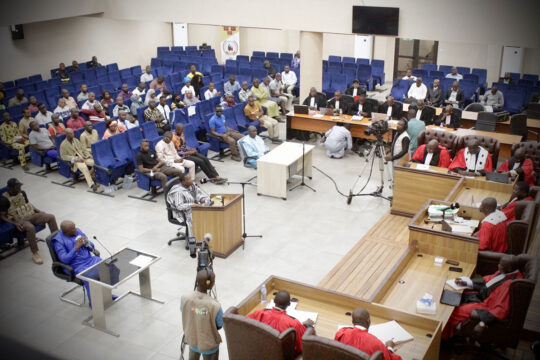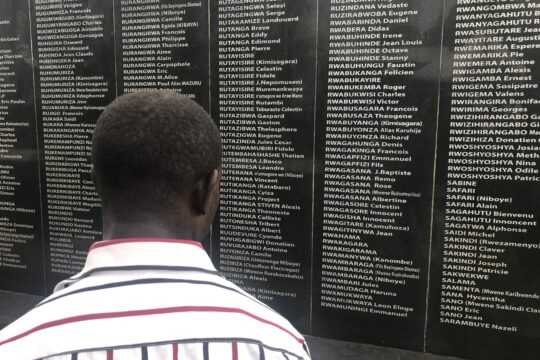Three years ago, to mark the 50th anniversary of the formation of the Organisation of African Unity, the African Union (AU) signed a solemn declaration to end strife on the continent and to work for peace and prosperity.
The declaration’s noble goals were to rid Africa of violent conflicts, wars, human rights violations and humanitarian disasters, and to prevent genocide. More ambitiously, leaders pledged not to bequeath the burden of conflicts to the next generation and to end wars on the continent by 2020.
The declaration is part of the AU’s Agenda 2063 vision, titled “The Africa We Want”. This envisions:
An integrated, prosperous and peaceful Africa, driven by its own citizens and representing a dynamic force in the international arena.
The framework builds on, and sets to speed up, the implementation of past and existing initiatives for growth and sustainable development. These include the Lagos Plan of Action for the Economic Development of Africa, adopted in Nigeria in 1980, and the New Partnership for Africa’s Development, adopted in Lusaka in 2001.
The agenda for the next 50 years has been organised around shorter-term action plans. Following the 2013 declaration, work started in earnest to produce the Agenda 2063 “Framework Document: The Africa We Want”. And in September 2015 the implementation plan for the first ten years (2014-2023) was published.
One of the flagship projects and initiatives is “Silencing the Guns by 2020”. This signals the aspiration for a peaceful and secure Africa as the most urgent priority.
If the AU does not prevent, resolve and eliminate all the destructive conflicts that continue to flare up on its watch, “the Africa we want” – of unity, peace and prosperity – will remain an elusive grand ambition.
A Herculean task
Silencing the guns by 2020 will require a Herculean effort on the part of the AU Peace and Security Council. The council’s remit is to prevent, manage and resolve conflicts. It is also responsible for maintaining peace and security.
Putting an end to bloody conflicts will also place the African Peace and Security Architecture under considerable strain. Some of its pivotal parts remain under construction. The architecture comprises the Peace and Security Council and other vital institutions such as the Continental Early Warning System.
The AU has an unenviable task ahead. The scourge of terrorism threatens to cripple the already fragile Somali state, as the Al-Shabaab onslaught continues. Considerable gains have been made by the AU Mission in Somalia against the terrorist group. Nevertheless the threat of further attacks remains omnipresent.

In Nigeria Boko Haram continues with its brutal suicide bombing attacks, its weapon of choice being innocent women and young girls.
Several other African states, such as the Democratic Republic of Congo, Burundi, the Central African Republic and South Sudan, remain restive, repeatedly teetering on the precipice of renewed conflict and violence.
A further grave concern is the dearth of political tolerance apparent in the domestic politics of several AU member states. This is despite the 2007 adoption of the African Charter on Democracy, Elections and Governance. The pivotal document only came into force in 2012 and some states have not yet signed it.
Political intolerance, as witnessed prominently in several countries as far afield as Zimbabwe, Kenya and Uganda, has created an environment in which political debate and dissent are being smothered. This undoubtedly sows the seeds for future conflict.
Another source of instability crying out for attention on the continent is the tendency among such leaders as Zimbabwe’s Robert Mugabe and Uganda’s Yoweri Museveni to cling to power in perpetuity. These “presidents for life” have had a detrimental and devastating effect on many African states since independence.
From intention to proactive intervention
To genuinely achieve Agenda 2063’s noble objectives, the AU should invest in proactive prevention of conflict as opposed to reactive intervention. This is considerably more difficult to achieve.
In particular, the slow progress in putting into full operation the African Standby Force has hampered the continent’s efforts to tackle violent conflicts more decisively.
The AU Peace and Security Council needs to do more than just issue strongly-worded communiques condemning errant member states. These need to be reinforced with genuine punitive action and credible consequences. Swift, consistent and concrete action is required in all instances. The AU has an exemplary record in acting against unconstitutional changes of government, which includes automatic suspension from the activities of the Union until constitutional order is restored.
An equally strong response is required against incumbent governments that fail to protect their citizens against mass atrocity crimes committed within AU member states. In this regard the AU has been reluctant to fully invoke its Article 4(h), which explicitly makes provision for
the right of the Union to intervene in a member state pursuant to a decision of the Assembly in respect of grave circumstances, namely: war crimes, genocide and crimes against humanity.
The article appears to be the most potent instrument available to the continental body in its Constitutive Act, and one that should be used more frequently in dire humanitarian emergencies. But it remains inconceivable that it will be invoked anytime soon to justify military action against a sovereign government within the AU, reducing it to a paper tiger.
There is also no shortage of examples where the AU has been undermined in asserting its authority at critical times in the peace and security debate. If it is to maintain any credibility, it should avoid having this salient function and role usurped by foreign actors, as happened during the crisis in Libya in 2011. Today, Burundi provides an ideal opportunity for the AU to redeem itself.
By 2063 the AU should be acting as the sole guarantor of peace and security in Africa. Getting Africa to speak with one voice as well as to act in unison in this critical realm will be crucial.
The deadline the continent has set itself to achieve unity, peace and prosperity is still a considerable time away. But we are only four years away from the deadline it set for silencing the guns – 2020. And turmoil, insecurity and instability are still evident in far too many African states.
![]()
Gerrie Swart, Lecturer: African Politics and Political Conflict in the Department of Political Science, Stellenbosch University. He is also the Founding Editor of the ‘Journal of African Union Studies’, Stellenbosch University
La version originale de cet article a été publiée sur The Conversation.




